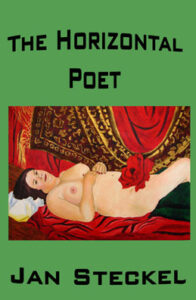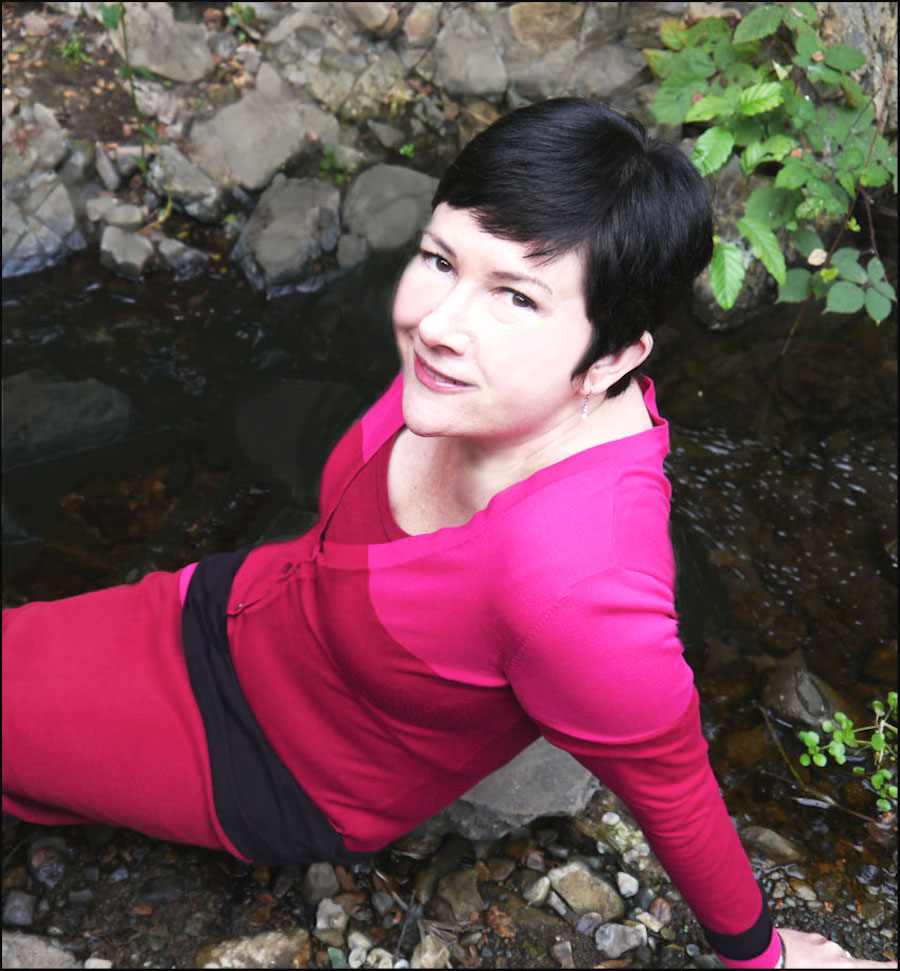By Jan Steckel
When I was thirty, while divorcing my first husband, I found a girlfriend at a Pride march in Washington, D.C. I was wearing a Lesbian Avengers muscle shirt. She twirled in a rainbow skirt. We rode the train back up the coast together, singing Ferron and Phranc songs in harmony all the way. That summer we went to four different Pride parades together: D.C., Boston, Hartford and New York. On the isle of Manhattan, I fell on my knees before a goddess named RuPaul, who blew me a kiss from her float.
A couple years and a few girlfriends later in New England, I started an abortive romance with a gay-identified guy. He had a husband, but he liked to have sex with women sometimes for fun and was looking for someone to give birth to a baby for him and the husband to raise. He told me that bisexual people didn’t exist: no one was fifty-fifty. Everyone had a preference. Then he kissed me on the lips.
That summer the Lesbian Avengers made a float of a rolling bed with two women making out on it. All the uptight lesbians I socialized with complained about how it embarrassed them, how that kind of flagrant display just made it harder for everyone. I thought it was fantastic, and I knew I had to get out of that parochial, provincial city and find some other bi people.
I took a job at Natividad, a county hospital in Salinas, California, between the middle of nowhere and the end of the line, taking care of the children of migrant fieldworkers. I only knew one queer person there, a gay guy who managed the clinic where I worked. He took me to nearby Castroville, the artichoke capital of the world, to a restaurant with a twostory plaster artichoke in front of it with spines as thick as my arm. Down the main street – the only real street – was a bar and restaurant called Norma Jean’s.
Every Saturday night at dusk Norma Jean’s turned into the only gay bar this side of Monterey. Mexican men in snakeskin boots and ten-gallon hats drank 40’s of Corona and Tecate with wedges of lime on the bottlenecks. They danced together to slow bachatas while a disco ball sent twinkling stars across their faces. When it came time for me to leave Salinas, the family practice residents I’d been teaching at the hospital threw me a going-away party at Norma Jean’s. At the stroke of midnight, under the disco ball, a beautiful Mexican drag queen danced around a sombrero on the floor to the strains of the jarabe tapatío.
I’d been going out with a straight psychiatrist from the hospital and wanted to stay with him when my job there ended, but I couldn’t find a decent long-term position in Salinas or Monterey. I interviewed at hospitals up in the San Francisco Bay Area, thinking we could keep up our relationship over a one-and-a-half-hour drive. Part of me knew I had to get to San Francisco, the home of Anything That Moves, the first bisexual magazine I had ever seen. While I was working in Salinas, they published a bi manifesto of mine called “I Just Do This to Seduce Gay Men.” It was a reply to the gay man back in Boston who wouldn’t define himself as bi despite sleeping with a man and with women, and who felt the need therefore to declare that bi people didn’t exist. I had been reading Anything That Moves in Boston, dreaming of a place with enough out bi people to run a magazine.
Before my job interview for a pediatrics position at Kaiser-Permanente in Hayward, just across the bay from San Francisco, I visited a now-defunct women’s bookstore on the Berkeley-Oakland border called Mama Bear’s. It was across the street from a friendly neighborhood gay bar called the White Horse, where I still play pool sometimes. I asked the woman behind the counter at Mama Bear’s where their bisexual section was. She glared at me and said they didn’t have one, only lesbian and feminist sections. I asked if I could use their pay phone (it was before everyone had cell phones) and defiantly called my boyfriend, who proceeded to dump me over the phone right before my job interview. I hung up and looked around the store, which was full of cute women. I should have felt awful, but instead I felt light and free. I thought about all the women I could date now, and how narrowly I had escaped a straight marriage and the psychiatrist’s four-bedroom house in the bedroom community of Morgan Hill. After the interview, I called my best friend, and we drove out to the Golden Gate Bridge. I pitched my birth control pills over the bridge railing into the bay. My friend, a lesbian obstetrician-gynecologist, talked about all the estrogenized fish I was creating. I looked across the bay at San Francisco, and I knew I had come home.
Within the year, I met my husband-to-be at Berkeley BiFriendly, a monthly get-together at the Au Coquelet Café. We’ve been together for sixteen years, and he still hosts the group. We march every year in the Bay Area Bisexuals Network contingent in the SF Pride Parade. The other night, we dined at the café again for the monthly meeting, reminiscing with bi friends he’s had for twenty years and I for sixteen. Some of them have children now who come to the café and play math games with us. One of the adults presented as a man when he started coming, but now she’s been living as a woman for a decade and a half. These are my people. This is my peer group and my support group. I’m always glad to see them, for the laughter, the understanding, the full warm hugs when we meet and when we part. I don’t have to explain or pretend, and neither does anyone else. This is what it means to be home.
Jan’s full-length poetry book The Horizontal Poet (Zeitgeist Press) won a Lambda Literary Award for Bisexual Nonfiction. Her writing has appeared in Yale Medicine, Scholastic Magazine, Anything That Moves, Bi Magazine, Bi Women Quarterly and elsewhere. Her work has won numerous awards and has been nominated three times for a Pushcart Prize. She is currently shopping around a short story collection to publishers.


